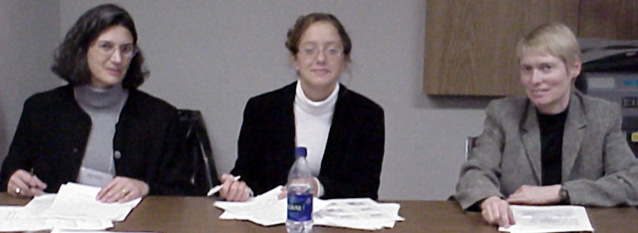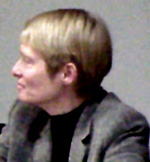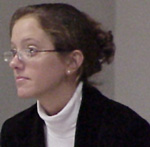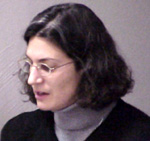A
Research Symposium Presented by |
|
| An
Event in Honor of Women's Month Sponsored by the Center for Gender Studies at Radford University |
|
| Time
& Date: Location: Admission: |
11:00
- 12:15, Tuesday, April 1st, 2003 Heth-Lounge A, Radford University, Radford, VA Free |
| Symposium
Panel Members (from the left): Dr. Jeanne Mekolichick, Jacki Quinlan, Dr. Hilary Lips |
|
 Symposium Presentation Overview: Researchers now see the self-concept, not as simply a collection of self-attributed traits, but as a lens through which individuals see and organize reality (Ross & Nisbett, 1991). Some argue that individuals see each situation through the lens of their own self-views, and thus self-views make a difference in the way situations impact on them. Constructivist approaches posit something even more complex:: that humans actively create and construe their personal realities–that each person creates his or her own representational model of the world (including the self) and that this model does not simply act as a filter through which ongoing experience is perceived, but that the model actually creates and constrains new experience (Mahoney & Lyddon, 1988). Theorists also argue that an individual’s definition of her identity is critical to her comfort with various choices and behaviors. This panel explores ways in which issues of self and identity interact with choices with respect to university-level teaching and learning in the realm of science and technology. |
|
| ____________________________________________ | |
| University Students’ Self-Views and Their Choices to Pursue or Avoid Studies in Science and Technology presented by Hilary M. Lips, Radford University | |
Biographical
information:  Hilary Lips is a professor of psychology, chair of the Psychology
Department, and director of the Center for Gender Studies at Radford
University. A Canadian by birth, she taught at the University of Winnipeg
for many years before moving to Virginia. She has written extensively about
women and gender; her research has focused largely on gender and academic
choices and power. For further information, visit Dr. Lips' personal web
site at: http://www.radford.edu/~hlips
Hilary Lips is a professor of psychology, chair of the Psychology
Department, and director of the Center for Gender Studies at Radford
University. A Canadian by birth, she taught at the University of Winnipeg
for many years before moving to Virginia. She has written extensively about
women and gender; her research has focused largely on gender and academic
choices and power. For further information, visit Dr. Lips' personal web
site at: http://www.radford.edu/~hlips
Presentation Overview: |
|
| ____________________________________________ | |
| Encounters that Matter: Students’ Reports of Interactions and Events that Changed Their Sense of Possibility by Jacki Quinlan, Radford University (presenter) and Hilary Lips, Radford University | |
Biographical
information:  Jacki
Quinlan is a senior undergraduate student in psychology at Radford University.
She is currently the president of the Radford chapter of Psi Chi, the Psychology
Honor Society. Her email address is: jaquinlan@radford.edu Jacki
Quinlan is a senior undergraduate student in psychology at Radford University.
She is currently the president of the Radford chapter of Psi Chi, the Psychology
Honor Society. Her email address is: jaquinlan@radford.eduPresentation Overview: Researchers have sometimes found that individuals’ possible selves (Markus & Nurius, 1986) can be influenced by events and interactions that, while perhaps insignificant to an outside observer, take on a large subjective importance to the person involved. For example, young adults’ self-concepts and future plans have been shown to be significantly influenced by parents and friends (Makri-Botsari, 2000; Tucker, Barber, & Eccles, 2001) and by celebrity idols (Boon & Lomore, 2001). In this study, we sought to determine whether particular events and interactions had an impact on students’ sense of possibility for themselves, particularly with respect to academic choices. Forty undergraduate students completed a “daily diary” study, in which, twice a week for 4 weeks, they completed and submitted an on-line questionnaire that asked them to describe significant interactions and events of the previous day. For each of these interactions and events, they were asked to indicate whether and how it had influenced their own sense of what was possible for them. This paper reports on the findings for the 33 female respondents. Results revealed that, for many of the women, the most often-reported significant interaction was with their mothers. Other persons who figured prominently in these interactions were boyfriends, fathers, best friends, and professors. With respect to significant events, frequently reported were events related to taking tests or receiving test results, receipt of e-mail communication, and the viewing of television programs. The ways in which respondents reported that these interactions and events influenced their feelings about themselves and their sense of possibility ranged from academic and career possibilities, to personal relationships, to general self-confidence. Implications for students’ behavior with respect to technology, learning, and academic choices are discussed. |
|
| ____________________________________________ | |
| Conceptions of Self, Sex, and the Use of Digital Technologies in a Teaching and Learning Environment by Jeanne Mekolichick (presenter), Radford University and Denzel Benson, Kent State University | |
Biographical
information:  Jeanne
Mekolichick is an Assistant professor of the Department of Sociology
& Anthropology at Radford University. She is interested in
processes of the self, and particularly issues concerning the self and identity.
For further information, visit Dr. Mekolichick's personal web site
at: http://www.radford.edu/~jmekolic/ Jeanne
Mekolichick is an Assistant professor of the Department of Sociology
& Anthropology at Radford University. She is interested in
processes of the self, and particularly issues concerning the self and identity.
For further information, visit Dr. Mekolichick's personal web site
at: http://www.radford.edu/~jmekolic/
Denzel Benson is a professor of sociology at Kent State University. He is a sociological social psychologist who has spent most of his career exploring questions concerning the effects of groups, culture and organizations on individual functioning. He is especially interested in how such meso- and macro-level forces affect various aspects of self. Presentation Overview: While research has identified various personality and demographic characteristics that appear to be associated with a variety of activities related to the use of digital technologies (e.g., Biner, Dean and Mellinger 1994; Biner, Summers, Dean, Bink, Anderson and Gelder 1996; Black 1992; Clark 1993; Figueroa 1992), little is known about how conceptions of self might influence the use of digital technologies in a teaching and learning environment. (Benson, et.al.2001). This study is the first empirical attempt to understand this relationship, paying particular attention to sex differences. Using a sample of undergraduate students and faculty from two public universities in the United States, we examine how individuals’ sex and conceptions of self affect the desire to use and success in using digital technologies in a university environment. Using Identity theory (e.g., Burke and Reitzes 1991; Stryker 1980), preliminary analysis indicates that conceptions of self are positively correlated with the desire to use and the success in using digital technologies among both students and faculty. Some sex differences were found among students regarding how respondents viewed themselves relative to the use of digital technologies. However, the only sex differences found among faculty was the comfort level in using digital technologies; female faculty members were statistically significantly more comfortable in using digital technologies than their male counterparts. These findings may help faculty and students better understand the implications of using digital technologies in teaching and learning environments as well as suggest new hypotheses for further exploration of this relationship. No differences by sex were found in students’ use of various digital technologies or their comfort in using digital technologies. However, the degree of integration of digital technologies with the self, the desire to use digital technologies, and the degree of computer self-efficacy were statistically significantly higher among men than among women for each of these variables |
|
|
|
|
|
Guest Speakers at RU
Center for Gender Studies Psychology Home Page Sociology Home Page RU Home Page |
|
| Website Created by W. Andrew & H. Lips Last updated September 11th, 2019 |